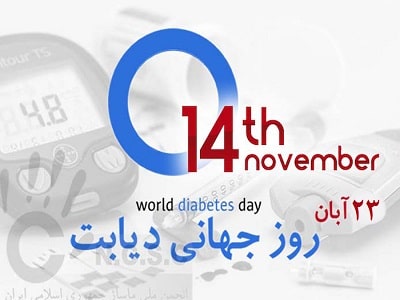World Diabetes day- Know your Risk, Know your Response
What is diabetes?
We have all heard the name of this disease, even if we ourselves or those around us do not have diabetes. Having knowledge regarding diabetes is helpful for managing this chronic disease for those who are affected by it or their loved ones. This group of people should be familiar with all the behaviors and dietary restrictions specific to diabetes and adhere to them. They should also be well acquainted with the process of diagnosis, monitoring medication doses, and treatment of this problem. Fortunately, there are appropriate treatments available today for controlling diabetes, but we all know that prevention and early detection are always much better than treatment.
By understanding this disease, its factors, and conditions of occurrence, we can prevent its onset or properly deal with it in the worst case scenario. The importance of understanding this disease is to such an extent that November 14th, which coincides with 23rd Aban in the Iranian calendar, has been designated as World Diabetes Day. But what is diabetes?

Glucose is a type of carbohydrate found in bread, various fruits, dairy products, and is considered the most important free sugar in the bloodstream of animals. Animals use this sugar as fuel for the brain, cells of the nervous system, and red blood cells. This sugar is also known as the most abundant chemical compound and is found abundantly. When the human body cannot use glucose to provide energy or store it, it is said that the person has developed diabetes – a chronic disease.
In fact, if the pancreas cannot produce the insulin hormone needed to transport glucose from the bloodstream to the body’s cells or if the body cannot properly use this hormone, this disease occurs. Since all foods consumed by humans are ultimately broken down into glucose, the inability to use it leads to a phenomenon called glucose accumulation and consequently an increase in blood sugar levels and ultimately an increased risk of diabetes. The above information explains diabetes in the simplest and most understandable way possible. In fact, diabetes is a disease that must be taken seriously because otherwise it can cause multiple damages to organs and tissues of the body. Damages that manifest themselves in eyes, kidneys, nerves, and heart.

What is the significance of World Diabetes Day?
We know that the selection of an international day for any category is made in order to attract the attention of public opinion to that issue. It is for this reason that November 14th is designated as World Diabetes Day. In 1991, 32 years ago, the World Health Organization in collaboration with the International Diabetes Federation decided to name November 14 as World Diabetes Day to draw public attention to the increasing growth and spread of diabetes. The United Nations officially registered this day in the calendar in 2006. The biggest thing that is done on this day is creating big information and awareness campaigns. The International Diabetes Federation has chosen a special slogan every year and all the information provided on this day will be around that slogan.
The international theme for this day is: “Know your risk, Know your response” and the theme of the national diabetes week in Iran is “Accessibility of care for people with diabetes”.
In our country, from 2013 onwards, with the efforts of the Ministry of Health, Treatment and Medical Education, every year the last week of November is declared as the National Diabetes Week. Associations supporting diabetic patients play an active and effective role at this time.
This day (November 14) has been chosen as the World Diabetes Day, on the occasion of the birthday of Dr. Buntig, who discovered insulin. But it should be seen what are the main activities carried out on this day. We can state three main axes for the activities carried out on this day, which are:
- Paying attention to the needs of the diabetic community and providing these needs
- Emphasis on the implementation of programs in order to control the risks that diabetes can bring to society.
- Drawing the world’s attention to this disease and ways to manage this problem
Who is at risk of diabetes?
One of the most important actions that is emphasized on the World Diabetes Day is to take a blood test to diagnose diabetes. In fact, people’s blood sugar levels are measured by performing tests such as fasting blood sugar (FBS), two-hour blood sugar after breakfast (2hpp), and HbA1c. These tests are very convenient and do not require any special action; Rather, it is done by taking a small amount of blood from a fasting person. Although it is recommended that all people do periodic checkups, it is more necessary to do this test for some groups of society. For example, we can mention the following:
- Those who have a family member with high blood sugar or diabetes.
- Since there is a special type of diabetes called gestational diabetes or gestational diabetes, it is necessary for pregnant women to undergo this test.
- Obese and overweight people

World Diabetes and Screening Day
As we mentioned, campaigns are generally held on World Diabetes Day, which, in addition to informing about diabetes and its risks and complications, also emphasize the necessity of conducting clinical trials to diagnose this chronic disease. Also, some of these campaigns conduct diabetes screening tests themselves. Doctors always insist that people at risk of diabetes should not neglect regular periodic tests.
You can click here to get more information about the types of screening tests. Also, if you wish to perform periodical check-up tests and use online admission and in-home sampling of Payvand laboratory, please proceed through the links below or call 021-71400004.


